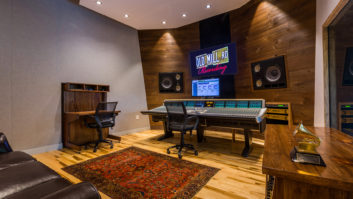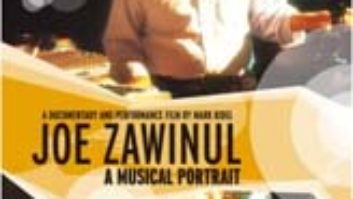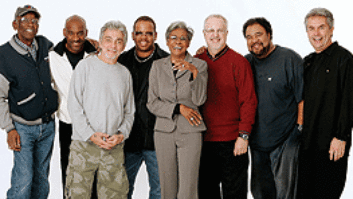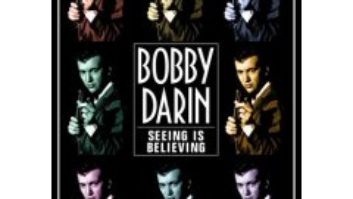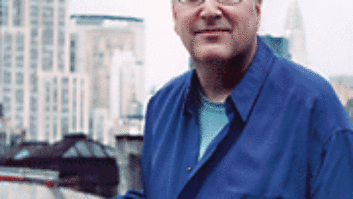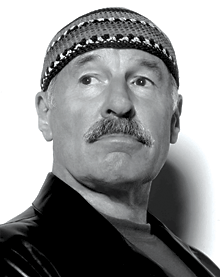

Joe Zawinul is not one to rest on his laurels, or even to revisit his past particularly. The one-time co-leader (with sax giant Wayne Shorter) of the great pioneering fusion band Weather Report, he has led his own ever-changing world/jazz group, the Zawinul Syndicate, for more than 20 years now, and he shows no sign of slowing down. Generally speaking, he has left his Weather Report days behind him; he cherishes the memories but largely avoids the repertoire, preferring to look forward. But during the past year, Zawinul has given his blessing to two exciting projects involving Weather Report’s music: Last fall, CBS released a comprehensive three-CD/one-DVD retrospective box set called Forecast: Tomorrow (for a review, see “Cool Spins,” December 2006); and more recently, the Heads Up label put out a superb live disc called Brown Street, which finds Zawinul fronting a big band (as well as a few players from the Syndicate) performing Weather Report material (as well as two songs from his post-WR bands and his “In a Silent Way,” which predates WR) specially arranged for that configuration.
Photo: Holger Keifel
If you’ve listened to much Weather Report, then you know that re-arranging the group’s songs for a big band is not really much of a stretch: You can almost hear the myriad horn voicings in Zawinul’s original keyboard textures (and in Shorter’s sax parts). It’s a wonder, actually, that no one thought of this before now — although I suppose Zawinul’s Weather Report signature song, “Birdland,” has been a staple of American college marching bands for years. (That tune is not on Brown Street.) Zawinul says the genesis of the Brown Street project actually goes back nearly 20 years.
“It really starts with Friedrich Gulda, who was one of the three or four most important classical piano players of the 20th century and, like me, is from Vienna,” says Zawinul from his Malibu, Calif., recording studio. “He was a famous interpreter of Mozart’s music and Beethoven’s piano music. What Glenn Gould was for Bach, Gulda was for Mozart and Beethoven. But he was also a jazz player and he had a festival every year. In 1988, he and I played the ‘Hayden Piano Variations for Two Pianos’ by Johannes Brahms, and we recorded that in Cologne [Germany]. But during this festival, we also played the piano concerto [Gulda] wrote for two pianos and big band, which was the WDR [Westdeutsche Rundfunk] Big Band of Cologne. I was very impressed by them at that time, and later we did a radio production. When I met them, they’d been together already 10 or 12 years. They’ve worked with all sorts of people, from Joe Williams to Quincy Jones and Ella Fitzgerald, some of which will eventually be released on my label, Birdjam. Anyway, many years passed and then Joachim Becker, who handles my record company, suggested we get together with the WDR and do some of this old Weather Report music, which, in general, has never been covered by anybody. I said I’d only do it if we came up with something really fresh. So I had Vince Mendoza adapt the songs from my original arrangements from Weather Report, and he did a helluva job.” (Zawinul adapted “Procession” himself.)
At first, the intention was just to get together for some live gigs in Europe, “but I wasn’t sure if I wanted to record it,” Zawinul says, “because, to be honest, I was afraid it might sound a little stiff. So much of my music is in the grooves, and I wasn’t sure if we’d get that part of it right at first.” He shouldn’t have worried: “We rehearsed [the WDR] section by section over a couple of days and then together, and then I put the rhythm section on it — some guys who’ve played a lot with me: Alex Acuña, with his full percussion setup, Victor Bailey on bass [both are Weather Report and Syndicate alumni] and my regular drummer at that time, Nathaniel Townsley; all great players! We had four or five days of rehearsal in Cologne and then we played my club in Vienna, Joe Zawinul’s Birdland, and that’s where we recorded the album.”
Zawinul’s Birdland club opened in May 2004 and has quickly developed into one of the most prestigious jazz venues in Europe. “It’s a fantastic place!” Zawinul enthuses. “When people are sitting, it holds about 220. It has two floors; it’s very classy. We have recording equipment there [based around Logic and M-Audio preamps], but we brought in a remote [and recorded to 48 tracks of Pro Tools]. It’s not a large bandstand and we had 14 horn players, plus my band and a guitar player [from the WDR]. The saxophone players were sitting so close together they were practically rubbing elbows!
“I conducted the band the same way I do the small band,” he continues. “We had arranged it so that the tutti parts, where the whole band would come in, were by clues rather than how the bars were written. So I had the choice of how the solos went, how the music developed to bring them in and then there were hand signals I gave to the guys. It ended up working out really well. It was like there was a wire going through everybody. It was an incredible vibe.”

Zawinul and WDR actually ended up doing two European tours together about a year apart, and though he says the shows got better and better, “Those first shows at Birdland were special — they captured something, so I’m really glad we recorded it,” he says. There were also a number of tunes that were performed that didn’t make the two-CD set, as well as video of the band in action, so hopefully more will come of this remarkable union.
Some of the post-production on Brown Street was done by Zawinul’s son, Ivan, at their Malibu studio. “They sent the Pro Tools [sessions] here,” Ivan Zawinul says, “and my father and I went through it all, fixed a few little parts and then I edited it, too. There were a couple of minor overdubs at some of the edit points, and on ‘Brown Street,’ [Joe Zawinul] added some more to the bass line. I did a submix of all of Joe’s keyboard stuff here and then we sent it back to Germany with that stereo mix, the fixes and some other sound effects I added here.” Joe Zawinul and Becker share the overall production credit; engineers in Germany included Gerald Ernst, Reinhold Nickel and Christian Schmitt.
Ivan Zawinul loves Brown Street and even talks of creating some remix versions of certain tunes with a couple of rappers — “not ghetto rappers; international-sounding rappers,” he clarifies — but the project that’s been taking up most of his time recently is a career-spanning three-CD live retrospective from the Zawinul Syndicate, due in June or July most likely. “I did Joe’s live sound for about 20 years and I’m producing it and putting it together from my live tapes,” Ivan Zawinul says. “It took me eight months to go through all the shows — more than 400 DATs, 20 multitracks, a bunch of ADATs, even some cassettes. This stuff is absolutely Joe! At the moment, there’s about 35 tunes featuring 40 different musicians — everybody who’s gone through that group.
“And it’s not like a regular live album,” he continues. “I’ve done a lot of cutting between shows, rearranging tunes. Some of the [edits] I’ve done are like four years apart and feature different drummers, but sonically it all floats across perfectly. I’ve got one song where it has parts from Spain, Germany, Austria and Italy all cut together, but you can’t tell.”
The Malibu studio is based around an Amek Einstein console and Pro Tools, but Ivan Zawinul says the key to matching performances from different years has been “a TC [Electronic] Finalizer and a couple of other EQs; some plug-ins I don’t even want to name. I monitor the EQ and analyze them and match them that way. These are straight-off-the-board mixes for the most part, and fortunately the sound stayed the same through the years. The music is really unbelievable! At this point [in February ’07], Joe’s only heard about 20 percent of what I’ve done, but he’s loving it. He’s amazed.”
As for the other recent release — the Weather Report box — Joe Zawinul reports that he is satisfied with the way it turned out and believes that it shows the broad range of musical ideas for which the band always strived. “I always knew we had something very special, and we never had a headache about it,” he says. “We always wanted the next record to be different from the one before, and we kept that up for 15 or 16 records. We won all the polls [in jazz magazines] every year. Weather Report was one of the great music formations ever.”

From left: Alex Acuña, Nathaniel Townsley, Joe Zawinul, guitarist Paul Shigihara and the WDR Big Band
I mention that the band played “world music” before the genre even had a name and that the Zawinul Syndicate has gone even further in that direction, with its overt African, South American and other influences. “That’s true,” he replies. “A lot of people who’ve become known as ‘world music’ were influenced by Weather Report. When I made this record with Salif Keita [Amen, 1991] and worked with these West African master musicians, I learned that they all grew up with Weather Report. ‘Black Market’ was for 20 years the theme song on Radio Dakar in Senegal. It was one of the biggest albums in Africa. Some of these guys were later in my bands. I like to get that kind of energy and influences in my bands.
“I feel like American music has lost a lot because so many of the young guys are hanging on with old music. Much of it is really great, great music — some of the most adventurous and unpredictable music of the 20th century was bebop — but it became predictable and boring. I spend a lot of time in the car driving around, and I listen to the jazz stations here and it is almost embarrassing how these young people are playing almost note for note these solos that were played 50 years ago — the same notes, the same turnarounds. Even in those days, it was like a repertoire music: interpretive music, not always creative music. Because everyone tried to play like Charlie Parker, Dizzy [Gillespie] and Miles [Davis] and so on, and that’s okay — I did, too. But what’s amazing to me today is that young people coming up are trying to sound like that. Don’t misunderstand me — there are a lot of great musicians out there, some fantastic instrumentalists — but they don’t have original personalities, and that is sad. And that’s why I can’t play the music I want to with those kinds of people. The people in my bands have to have some originality. And that’s why I play with people from all over the world.”

LISTEN: Audio Clip
Black Market.mp3
